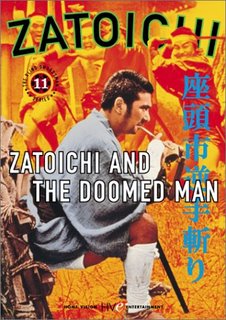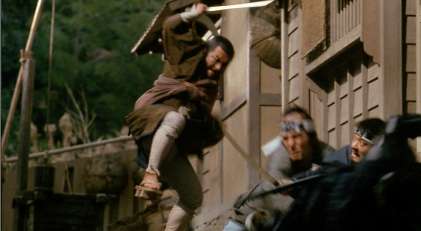 Zatoichi is a blind ('zato' means blind, ichi is his name) Japanese swordsman wandering the countryside in the Tokugawa Era (1600-1868). In his travels Ichi encounters all that you would expect: mockers of the handicapped, predators and those who simply wish to challenge his skill. Often times he is underestimated. It's a pretty good sign a character is going to die if you hear him say, "But he's just a blind man!" On a rare occasion Ichi's sword might be matched. But never bettered.
Zatoichi is a blind ('zato' means blind, ichi is his name) Japanese swordsman wandering the countryside in the Tokugawa Era (1600-1868). In his travels Ichi encounters all that you would expect: mockers of the handicapped, predators and those who simply wish to challenge his skill. Often times he is underestimated. It's a pretty good sign a character is going to die if you hear him say, "But he's just a blind man!" On a rare occasion Ichi's sword might be matched. But never bettered.But Ichi was also a person of compassion and justice. It riled him to see the poor oppressed or even to have himself picked on because someone saw him as an easy target. In his over 25 films, Ichi's flashing sword forced robbers to return money, killers to flee and "bosses" (mobsters) to pay for their sins. So when our blind hero was jailed and met a man wrongly imprisoned, it became his quest to set him free.
 Of course, it wasn't going to be easy. Powerful men had imprisoned the man because they needed him executed for what he knew about them. Ichi spends the entire film gathering evidence of the jailed man's innocense, ruffling many feathers along the way. In the final showdown to get the evidence to the proper authorities, a large group of samurai ambush him with nets and other contraptions - as well as their swords. It takes Ichi a good 10 - 15 minutes of film time to make it passed the entire gauntlet. Finally, the information does get through but only with a Herculean effort.
Of course, it wasn't going to be easy. Powerful men had imprisoned the man because they needed him executed for what he knew about them. Ichi spends the entire film gathering evidence of the jailed man's innocense, ruffling many feathers along the way. In the final showdown to get the evidence to the proper authorities, a large group of samurai ambush him with nets and other contraptions - as well as their swords. It takes Ichi a good 10 - 15 minutes of film time to make it passed the entire gauntlet. Finally, the information does get through but only with a Herculean effort.Every Zatoichi film ends with him resuming his wandering of fuedal Japan. This one is no different. But this time he hears a priest being obviously wrongly arrested by three government agents. As he hears him dragged away, Ichi does nothing. He saunters to a nearby beach and sits in reflection. He could spend a lifetime righting the wrongs of the world. But at some point, the world has to take responsibility for itself. There is no other way.

No comments:
Post a Comment